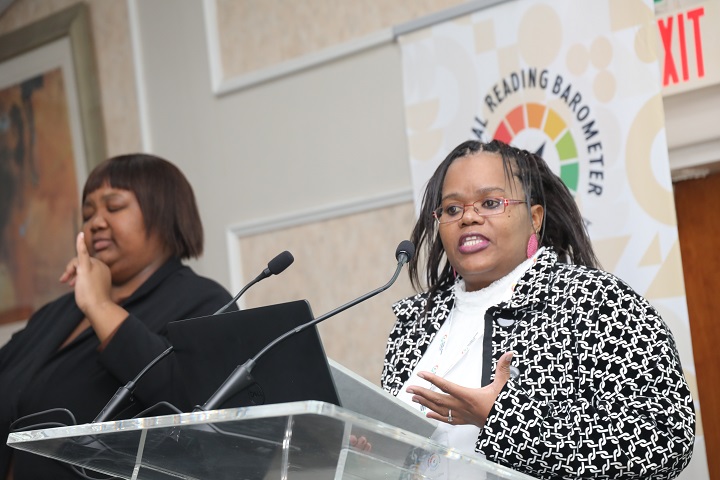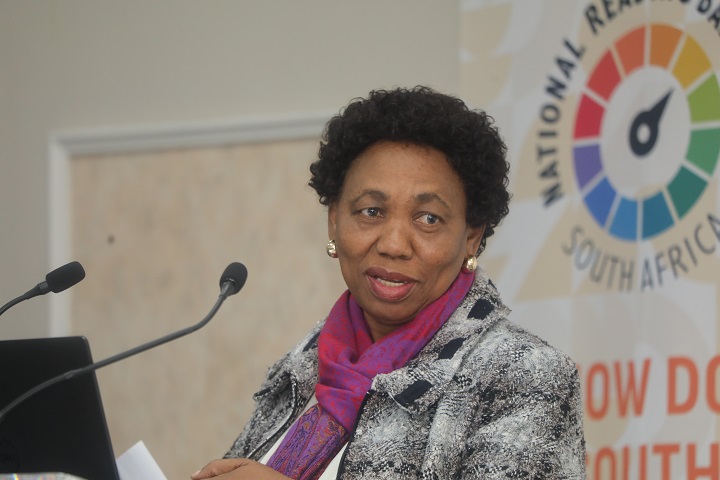A new national survey reveals that South Africans read more than we think and 83% of South Africans read in some way, whether for pleasure, to learn new things or to communicate with others, and 32% read books regularly.
However, they still face significant challenges accessing reading material, especially in African languages, and most children are growing up without any children’s books at home.
This is one of the key findings presented in the 2023 National Reading Survey (NRS), launched alongside the National Reading Barometer (NRB) project by the Nal’ibali Trust, the National Library of South Africa (NLSA), and a multi-sector project steering committee in Sandton, Johannesburg, on 13 June 2023.
Key findings
- 55% of adults read online materials, up from 7% in 2016.
- 52% of adults who live with children read with them, up from 35% in 2016
- Positive attitudes towards reading and reading with children have increased significantly since 2016
- 63% of homes do not have a single fiction or nonfiction book
- 65% of homes with children under age 10 do not have a single picture book
- 76% of African language speakers who read for enjoyment want to read in African languages, but book access lags behind demand
- Only 58% of adults can access a library, and most library users don’t borrow books
Both report results were presented during a high-profile launch event attended by industry experts and government dignitaries, including the Minister of Basic Education, Honourable Minister Angie Motshekga, who delivered the keynote address.
The Chief Director of Foundations for Learning at the Department of Basic Education, Kulula Manona, and the National Librarian and CEO of NLSA, Kepi Madumo, were panelists at this launch event that attracted about 300 representatives from basic education, libraries, non-government organisations, publishing houses, private funders and researchers that attended both in-person and virtually via Zoom.
Award-winning author and storyteller, Madoda Ndlakuse, and founder of Khutsong Literary Club and poet, Kgosietsile Monoto, opened the various segments of the programme by sharing original poetry and showcasing the rich storytelling tradition of indigenous languages in South Africa.
The NRS (‘Survey’) is a nationally representative survey of 4,250 adults in South Africa aged 16 and older that was weighted by age, race, geography, and socio-economic status. It investigates what, why and how adults read and prefer to read, and what barriers they face. It also includes questions on reading with children, digital reading, library use and language preferences.
The Survey revealed that while reading to some degree is widespread, about a third of people regularly read books and long texts for enjoyment, while others read short texts mainly or read to communicate. It also found that digital reading has grown rapidly since 2016, but that less avid readers strongly prefer paper.
Setting the scene at the start of the launch, Director of the Nal’ibali Trust, Nqabakazi Gina said the Barometer project’s 17-member steering committee set out to understand what reading culture looks like in South Africa, instead of measuring us against an imported definition or global standard.
 Picture: Nqabakazi Gina, Director at The Nal'ibali Trust speaking at the National Reading Barometer Launch.
Picture: Nqabakazi Gina, Director at The Nal'ibali Trust speaking at the National Reading Barometer Launch.
“This National Reading Survey is meant to unveil the current practices in terms of reading, the levels of motivation, access and also understanding the attitudes and beliefs around reading,” said Gina
The Survey findings indicate that even though 87% of people have some print materials at home such as religious books, newspapers, magazines, dictionaries and textbooks, only 37% have any fiction or nonfiction books at home.
The number of adults who live in a home with 11-20 books increased to 17%, up from 4% in 2016. Households with more than 20 books increased from 3% in 2016 to 15% in 2023.
More adults are reading with children and believe it’s important, but they don’t have enough children’s books: 65% of homes with children under age 10 do not have any picture books, and only 31% of parents said their oldest child owned a book by age 5.
About 28% of South African adults have visited a community library in the last year compared to 27% in 2016. Libraries are people’s preferred point to pick up free books and other reading materials to own.
Presenting the Survey findings Dr Katherine Morse from the Nal’ibali Trust said there's extensive global and South African evidence on the importance of deep reading of books, especially adult fiction, and the positive effect that books have in children's school performance and long-term socio-economic success.
“These forms of reading are important. However, these are not the only forms of reading. The National Reading Survey defines reading more broadly in ways that are adapted to our 21st century African context.
“This means taking into account multilingual reading, digital reading, especially by youth; reading for digital communication, that means WhatsApp reading. [And] a wide variety of materials, newspapers, religious books, online materials, including materials that are free, or shared or borrowed or otherwise accessible with few economic resources,” said Dr Morse.
Speaking on a panel discussion, Madumo highlighted the important role that libraries have in providing accessibility to reading materials.
“When libraries exist, they exist because they provide free materials and these are resources that communities must take advantage of. We have worked very hard within the library sector to make access to libraries free of charge,” said Madumo.
Delivering the keynote address, Minister Motshekga, emphasised the significance of individual book ownership among young children as it gives them open access to early literacy skills development.
Minister Motshekga said: “The report uncovered that more than two thirds of our children arrived at school without owning a single children's book. It forced me to look back because I raised a number of kids – my own kids and also [relatives’ kids] – and I ask myself, ‘did I buy them books even as a teacher?’
 Picture: Minister of Basic Education Angie Motshekga gave the keynote address at the National Reading Barometer launch.
Picture: Minister of Basic Education Angie Motshekga gave the keynote address at the National Reading Barometer launch.
I think the pride of having your own book [as a child] is something we must also raise consciousness of amongst parents […] because just the pride of just saying ‘this is my book’ [is important]”.
Although 76% of African language speakers who read for enjoyment want to read in their indigenous languages, access to reading materials, for adults and children, in indigenous languages still lags behind English and Afrikaans literature.
Manona emphasised the importance of collaboration with publishers and civil society to redress and increase the availability of books written in indigenous languages from an African context.
“We haven’t really redressed languages that are so underserved. It's going to be important that when we talk about book development, we really think very deeply about: how do we prioritise? Whom do we prioritise? Which languages do we prioritise?
As a department, we need to have access to these books that have been developed from an African context that will really show the child that ‘I'm there and I recognise myself. I am important’,” said Manona.
The NRB (‘Barometer project’), on the other hand, is a new compilation of secondary datasets, plus selected data points from the NRS, that collates and tracks changes in the overall health of the South African reading ecosystem. It assesses sector strength across four dimensions: the ability to read, access to reading materials, institutional framework (policy and budget), plus the motivation to read and behaviours towards reading.
Providing the rationale for the Barometer project, Social Impact Insights’s Founding Director Dr Tara Polzer-Ngwato, whose team led the data analysis, said the aim of the Barometer with its 55 measures was to provide a holistic view of South Africa’s reading ecosystem − both on its own and in comparison to its peers.
“What we're seeing out of our 55 indicators is that 46% of them, almost half of them are ‘emerging’ which means they're not as good as we would want them to be. But they're getting there.
What we do see as well is that we have 29% of our indicators being ‘constraining’, which means that in comparison to targets that have been set in the country or in comparison to similar countries elsewhere, we are simply far behind. And these are things that just don't work on their own, but that also constrain other things around them that should be working better,” said Dr Polzer-Ngwato.
The indicators measuring reading ability showed that children’s literacy skills, especially in early childhood and primary school, are below par. Many children entering first grade do not have the basic skills to start learning to read − a crisis that needs to be addressed. On the positive side, the literacy levels among adults and youths in South Africa align with those in other lower-to middle-income countries.
Some of the key recommendations from the project include:
- Increasing access to reading materials through large-scale campaigns to get a few books into every home.
- Promote reading with children from a very young age − before children can talk or have the ability to read on their own.
- Change the narrative that reading social media posts takes away from reading for enjoyment; instead use these platforms to encourage people to engage in other types of reading.
- Encourage reading books in indigenous languages by supporting more authors who write in African languages, including those who self-publish.
- Continue to increase accessibility and promote libraries in communities and raise more awareness about libraries’ digital services such as e-books.
The National Reading Survey and National Reading Barometer project will be repeated in 2026 and 2030.
-----About the National Reading Barometer project ---
The National Reading Barometer project describes adult reading cultures and the broader reading ecosystem in South Africa. The project is led by the Nal’ibali Trust in partnership with National Library of South Africa, including additional funding from the Zenex Foundation, the National Education Collaboration Trust (NECT) and the DG Murray Trust.
